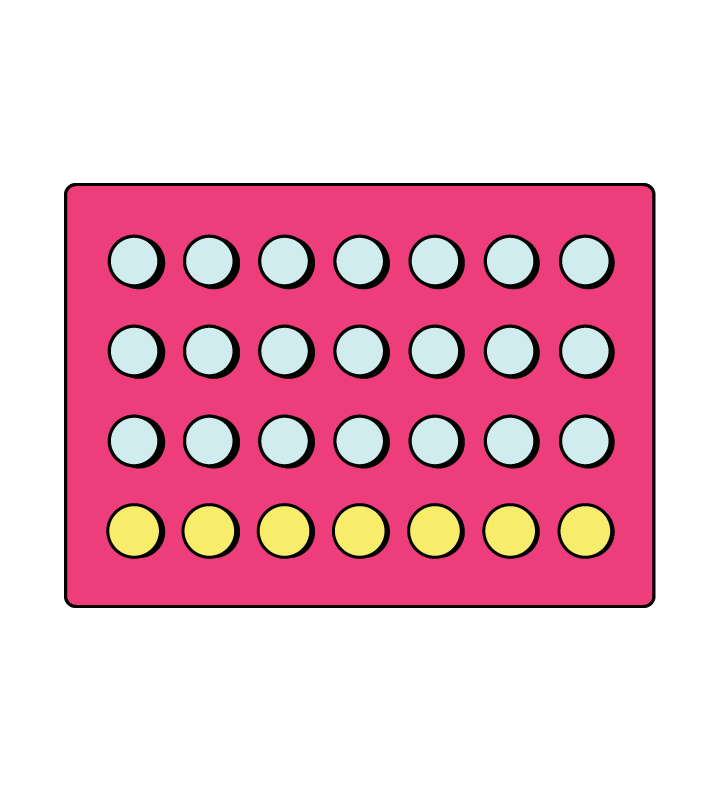It’s easy to take your period for granted (or, you know, wish it away forever)—but when that time of the month rolls around and you’re surprisingly cramp-, rage-, and blood-free, you might start to wonder: Am I pregnant?
First: Take a beat—periods can go MIA for all kinds of reasons. Still, that doesn’t mean you should totally ignore your missed flow.
“If you have one or two irregular periods it is definitely something to pay attention to,” says Sherry Ross, MD, an ob-gyn at Providence Saint John’s Health Center in Santa Monica, California.
So…how late can your period be while still being considered normal? According to Summit Medical Group, a period is considered late if it hasn’t started 5 or more days after the day you expected it to begin. Unless you already typically have irregular periods, definitely take a pregnancy test and check in with your ob-gyn regardless of the results if your flow has been MIA for a week or more. If there’s no way you’re pregnant and/or your text comes back negative (though, you may be too early in your pregnancy to get a positive result just yet), one of these factors may be to blame for your late period problems. Your doc can help you suss out what to do about ’em.
 .1. Major weight loss
.1. Major weight loss
“We know excessive exercising, sudden weight changes and being underweight can offset your hormone levels,” says Ross. “One of these hormones is called leptin and is produced in fatty tissue. Excessive exercising and drastic weight changes can decrease the body fat causing this and other hormones (like estrogen) to drop, contributing to irregular periods.”
2. Excessive exercise
Rigorous exercising, such as training for a marathon or triathlon, can cause physical stress, which may lead to a hormonal imbalance that screws with your period.
3. Stress
Significant stress—such as a divorce or death of a loved one—can disrupt your hormonal balance, creating delayed, irregular, and heavy periods, Ross says.
This is known as hypothalamic amenorrhea, says Alyssa Dweck, MD, ob-gyn and co-author of V is for Vagina. “This particular area of the brain, the hypothalamus, is where a lot of the hormones for your period are regulated,” she says. “The hypothalamus is very affected by stress.”
4. Polycystic ovary syndrome (PCOS)
PCOS is a medical condition caused by an imbalance of reproductive hormones, according to the Office on Women’s Health. It affects about 5 to 10 percent of women, says Ross.
“The hallmark of PCOS is irregular periods, excessive hair growth in places you would rather not see it, multiple cysts on the ovaries seen on a pelvic ultrasound, and infertility,” she says. “Your hormones—estrogen and testosterone—are completely lopsided and irregular.” When you have PCOS, Ross says your periods can come every two weeks, every three to six months, or even just once a year.
5. Your birth control
 .
.
“One of the side effects of a low-estrogen birth control pill is a light or non-existent period,” Ross says. “For many, this is a welcomed side effect.” The same goes for methods like hormonal IUDs, implants, or shots, since many of those don’t contain estrogen at all.
But if you’ve just stopped taking the pill, then take note: Ross says it might take one to three months to return to your normal cycle. Still, pay attention to what your period looks like when it finally comes back. “It may be once you are off the pill you may find you have an underlying hormonal problem that was masked by taking the birth control pill,” says Ross. If that’s the case for you, then it’s time to get in touch with your ob-gyn.
6. Thyroid dysfunction
The thyroid gland, located in your neck, regulates your metabolism, but it also interacts with many other systems in your body to keep things running smoothly. “If you’re dealing with any type of thyroid imbalance, whether it’s hypo- or hyperthyroidism, that can have implications for your period,” says Dweck.
Ross says other hormonal causes that could lead to irregular periods include Cushing’s disease, poor control of diabetes mellitus, premature ovarian failure, and congenital adrenal hyperplasia (a condition that limits hormone production in the adrenal glands).
7. Miscarriage
If you took a pregnancy test and it showed you were pregnant, then your period (or something that looks like a period) arrived late and heavy, it could be a miscarriage, says Ross.
 .8. Certain medications
.8. Certain medications
Whether you’ve been relying on certain OTC medications for an everyday headache or taking a prescription for a particular health issue, Ross says that some meds could be affecting your menstrual cycle. Aspirin, Coumadin (used to treat and prevent blood clots), and ibuprofen can all affect your cycle.
9. Pelvic inflammatory disease
This infection of the uterus, ovaries and/or fallopian tubes, which typically develops when chlamydia or gonorrhea is left untreated, can disrupt your cycle and cause irregular periods, according to Mayo Clinic.
10. Uterine fibroids
Uterine fibroids are noncancerous growths of the uterus, and they can cause heavy periods and super long periods, according to Mayo Clinic. This irregularity could make it seem like you’ve missed a period, too.
11. Premature menopause
When women under 40 have hormones misfiring in a significant way, they can go through premature menopause, also known as premature ovarian failure. Along with a missed period, signs of this condition include hot flashes, night sweats, and vaginal dryness.
But this shouldn’t be at the top of your list. “This isn’t very common, so you shouldn’t immediately worry about it,” says Dweck. If your ob-gyn rules out the many other potential causes for missed or late periods and thinks this may be the culprit, they’ll clue you in.
Source: Read Full Article
